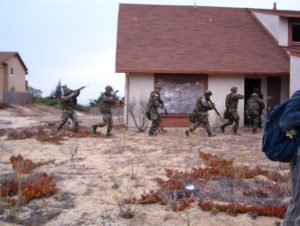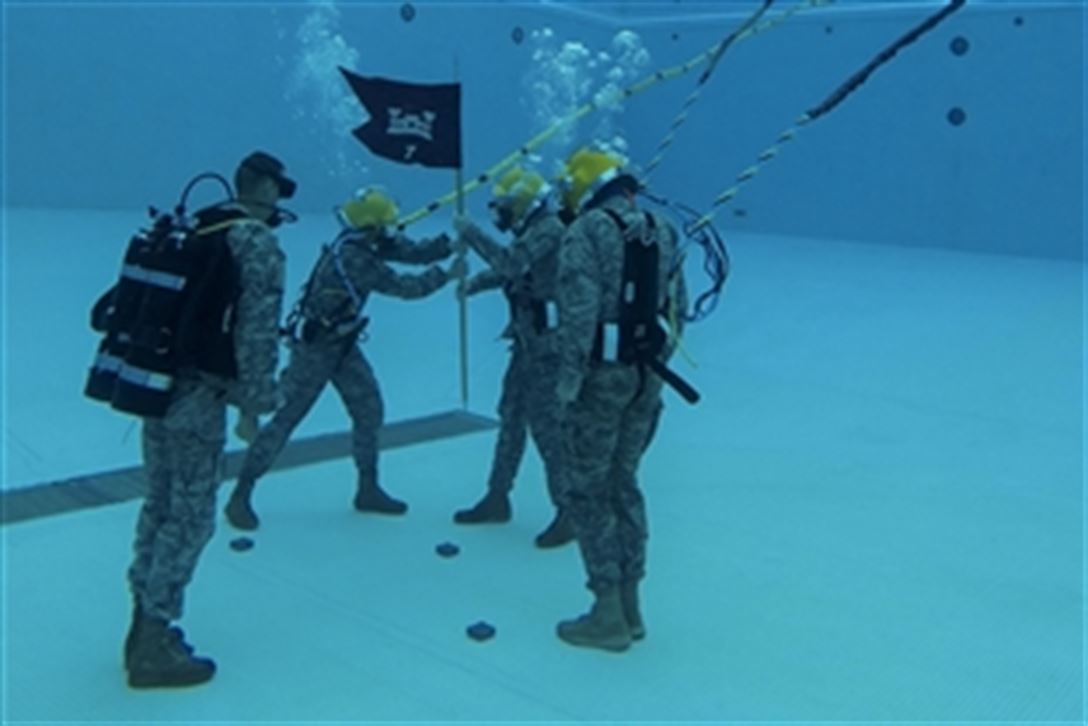
Soldiers training at Fort Ord, a former Army base in California closed in 1994 Author: Major Ken Koop
During my admittedly short time as a civilian, I’ve come across a few phrases that I was not familiar with during my time in the military. Profit Margins. Uniquely syndicate real-time functionalities. Zombie project. One that I really can’t wrap my head around, though is:
It’s nothing personal, it’s just business.
Well, my business is personal. For veterans, at least the ones I’ve come in contact with, anything meaningful to them becomes personal. There’s something very personal and interactive about being in the military. I was having a discussion with a community member the other day, a retired Air Force Colonel. We were talking about things that we both missed and didn’t miss about the military, and both agreed: a large part of it is the camaraderie. It’s so standard, it’s cliché. Band of Brothers. Brothers in Arms. There’s nothing like an old Army buddy, wing man, ship mate…you can pick up a conversation after being separated by years and it’s like it never stopped. It’s hard for that not to be personal.
So sure, in the military, you get yelled at sometimes. Goes with the territory. It’s hard not to take things personally when a Drill Sergeant is in your face, knife hand inches from the bridge of your nose. I remember my Drill Sergeant from Basic Training in 1992, Staff Sergeant Ingram. How could it not be personal for someone to make such an impact on you that you remember them nearly a quarter century later? I have that throughout my entire career; leaders, peers, subordinates that made such an impact on me that I will still remember their names even when I can’t remember what I had for breakfast that morning. Again, personal.
And combat? Can’t get more personal than that. I believe Dave Grossman, in On Killing, mentions something about that first moment of realization that a person in combat shifts their thought from “I’m being shot at” to “they’re shooting at me.” It becomes a very personal thing to be at one end of a two-way firing range, and you have a personal stake in the outcome. Not just for yourself, but more often for those around you. During my first Afghanistan deployment, my company had the responsibility to provide security escort to supplies for a remote Forward Operating Base; if I didn’t do my job, then nearly a thousand warriors would run out of fuel, food, water. Extremely personal.
So now we’re no longer in the Army and in the civilian world. I’ve often been told that my passion for my new mission is evident. When I go to a conference or an event, within a few minutes of meeting someone, the word “veteran” is going to come out of my mouth, and people later comment on seeing my heart and passion for the subject. Sometimes people marvel at it, many times people commend me for it, but it got me thinking; why is my passion so unique? What is it about me that is so different? The answer, I believe, is that, for me, it is personal.
How can you be passionate about something if you don’t take it personally?
This is a significant part of trying to find meaning and purpose in our post-military lives. If you, a veteran, are not passionate about what you’re doing, if it’s not personal to you, then chances are you are going to feel like you’re going to be missing a huge part of what made you enjoy your time in the service. You don’t have to be a mental health counselor, like me. Find something that makes you happy…that’s very personal. Find something that helps others, create something that brings understanding or awareness to others. Maybe that’s helping veterans find a job. Maybe that’s working with kids. Maybe that’s writing code that helps to guide drones…whatever it is that moves you, find a way to do that. “Nobody is going to pay me for what I want to do,” you say, and you’d be right; if what makes you happy is sitting on the couch playing Call of Duty, then chances are, you’re not going to be finding someone to give you money to do it.
So here’s the problem with passion, and one that I run into often. Passion can sometimes override your effectiveness, and taking things personally can burn you out quickly. To constantly be angry or frustrated because others can’t see your vision…quickly turns to bitterness. To often be discouraged or disappointed when others don’t seem to share your passion…that can turn into depression. This may be the ultimate goal of the phrase, “nothing personal, just business,” to allow you to understand that keeping things personal can get in the way of getting business done. Just as there is danger in too little passion in our jobs or careers, there is the danger of too much. I have seen where people have wrapped their entire identity around what they do, or (for veterans), what they did; that will certainly limit our effectiveness.
What are you passionate about? What about what you do is personal, and how do you do it? Does the personal part about the job get in your way, does ego and pride take over when things don’t seem to be going the way you think they should? Maybe that’s a sign that you are taking business a little to personally. Taking a step back, taking a knee, surveying the situation can certainly help put things into perspective.
I don’t think I know how to separate my passion from my business, and I don’t really want to. We all need to ensure that our passion, the personalness of business, doesn’t render us inert, and so must find balance in this, like in all things.
How are you pursuing your passion today?
Did you enjoy this post? Please comment below and share with your network in order to join the conversation regarding veteran mental health. You can sign up for updates from Head Space and Timing and follow Duane, a combat veteran and mental health counselor, on Facebook, Twitter and LinkedIn. Keep the conversation about #veteranmentalhealth going.



1 Comment
Sharon Gaul · February 5, 2017 at 12:09 pm
Duane, it is evident that you are passionate about your work and take it personal, but perspective is important. Thank you for your insights. When I began my teaching career, I thought I could “save” every kid. I found myself exhausted, so I began to take some timeouts and found new energy in the balance of career and family obligations.
Comments are closed.